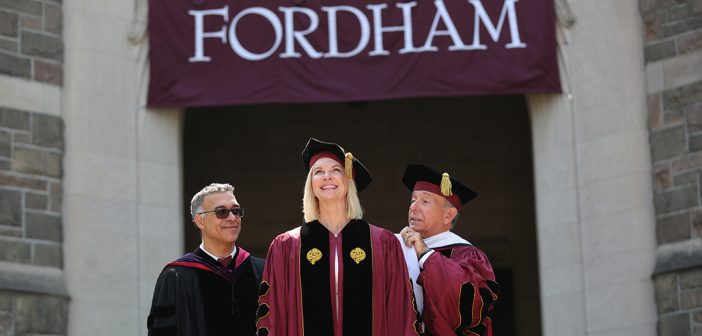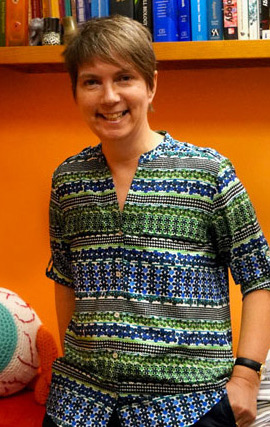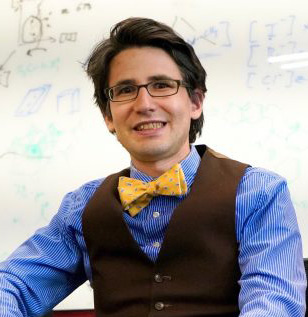The new chair is in addition to four others in the sciences that she and the estate of her late husband, Steve Bepler, FCRH ’64, funded in 2017. To be titled the Kim B. and Stephen E. Bepler Chair in the Natural and Applied Sciences, the new position is expected to advance the University’s vision for excellence in science education by fueling new interdisciplinary research into today’s most pressing scientific challenges.
“I want to thank Kim Bepler on behalf of the generations of Fordham students who will benefit from her extraordinary generosity,” said Tania Tetlow, president of Fordham. “Kim understands the University’s needs as well as anyone, and has long been committed to high-impact philanthropy that furthers academic excellence and our Jesuit, Catholic mission. We are deeply grateful for her gift, and for her ongoing engagement with Fordham.”
The gift comes as Fordham is seeking to expand its STEM programs in response to students’ growing interest in the sciences. It will advance the University’s $350 million fundraising campaign, Cura Personalis | For Every Fordham Student, and its goal of supporting student-faculty research, cross-disciplinary problem solving, and other facets of academic excellence.
The new Bepler chair will enable the University to recruit an intellectual leader and well-established scholar and teacher and provide this person with robust research support, said Dennis Jacobs, Ph.D., provost of the University and senior vice president for academic affairs. The right chair holder could help attract other talent to the University while providing leadership on important scientific questions that bring multiple fields together, he said.
“Many of the most promising scientific discoveries of our day emerge in the interstitial spaces between disciplines—between biology and physics or between chemistry and math or computer science. Addressing the most complex and consequential problems facing society really requires an interdisciplinary approach,” he said, giving the examples of mitigating climate change, combatting infectious diseases, and reducing the devastating impact of neurological disorders.
For instance, he said, “when we initially fill the endowed chair, our greatest priority may be to recruit somebody who works on next-generation renewable sources of energy. Well into the future, Fordham may choose to recruit a Bepler chair who applies artificial intelligence to identify novel therapeutics or addresses other important issues and problems.”
Philanthropic Impact
The Beplers were already among the University’s most generous donors at the time of Steve Bepler’s untimely passing in 2016. They funded endowed chairs in theology and poetics and gave in support of the Fordham Founder’s Undergraduate Scholarship, the restoration of the University Church, a new organ for the church, deans’ discretionary funds, and many other areas.
Kim Bepler also recently made a major gift in support of the Joseph M. McShane, S.J. Campus Center project, another critical piece of the Cura Personalis campaign, and created the Fordham Ukraine Crisis Student Support Fund to help the University’s Ukrainian and Russian students facing financial peril because of the Russian invasion.
“With this bold and generous investment, Kim helps set the pace for leadership support,” said Roger A. Milici, Jr., vice president for development and University relations at Fordham. “Our Trustees have strongly supported all of Fordham’s recent fundraising campaigns: their gifts have accounted for 35% or more of each effort. Fordham’s philanthropic culture is dynamic, and we are committed to helping our mission partners use their wealth and generosity to improve the human condition.”
The four other Bepler chairs in the sciences—established as part of a $10.5 million gift—include a chair in biology, held by Silvia Finnemann, Ph.D., who studies the neurobiology of the human retina, and one in chemistry, held by Joshua Schrier, Ph.D., who is pursuing possibilities for automated scientific research.
The University is seeking to fill the other two chairs—one previously held by the mathematician Hans-Joachim Hein, Ph.D., and one that will be directed towards biophysics, Jacobs said.
The gifts to establish these four chairs, as well as the new chair, reflect Steve Bepler’s desire to give back to the University by investing in world-class science programs that he felt any world-class university needs, Kim Bepler said.
“Steve deeply loved Fordham, and it’s a privilege to be able to help realize his vision for the University and cement his legacy like this,” she said. “I’m honored to be counted among those who are supporting our extraordinary science faculty, with their dedication that so clearly shows the Jesuit principle of magis at work, and I’m excited to see how this professorship will help our science programs grow in new directions.”
Building Connections
Schrier said he decided to come to Fordham as a Bepler chair because of the University’s Jesuit identity and because the position offered greater freedom to not only pursue research but also involve undergraduate students in it.
The endowed chair creates a few different benefits, he said—it expands the faculty and creates capacity for new types of classes that might not be offered otherwise. And by allowing for exploratory, proof-of-concept projects, “it really kind of serves as seed money for doing creative and exciting things and then taking those initial results and showing them to federal funders,” he said.
“There’s just tremendous value for interdisciplinary work” in the applied sciences, said Schrier, whose own research applies computer simulations and machine learning to the search for applications for perovskites, a crystalline mineral.
“I hope that the holder of this position will be able to build connections and ties with different departments here at Fordham and show students how all of this type of work is connected,” he said. “I know I have a lot of fun talking to colleagues in math, talking to and working with colleagues in computer science and physics. I think interdisciplinary [work]is great.”
He spoke of a number of such projects, including his work with chemistry and computer science professors to develop teaching labs that expose chemistry students to data science, a model they published last year in the Journal of Chemical Education.
“I’m really excited about [the new Bepler chair], and I look forward to meeting the holder of the chair,” Schrier said, “because it’s always great to add to and build our intellectual community here at Fordham.”
The Kim and Steve Bepler chairs have contributed to an increase of more than threefold in the number of endowed chairs at Fordham over the past two decades. The new chair in the natural and applied sciences will bring that number to 73.





